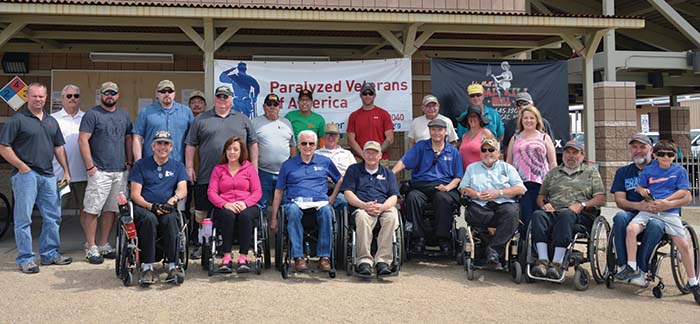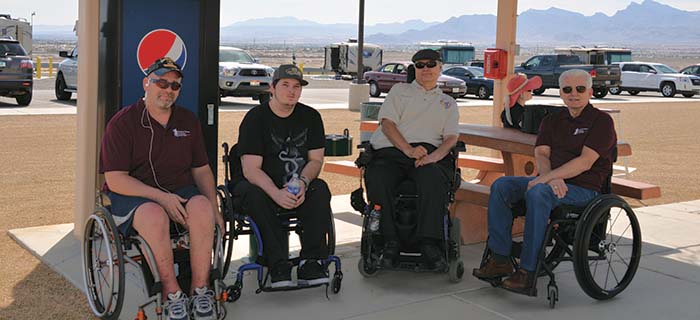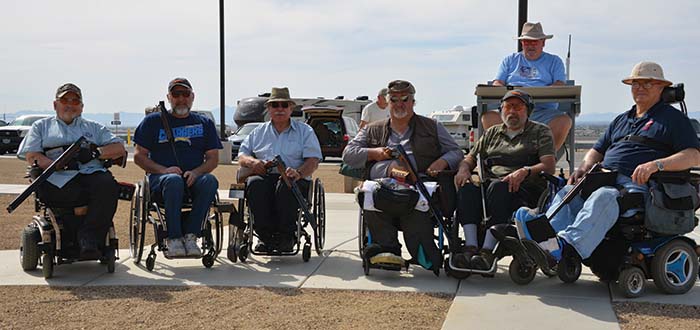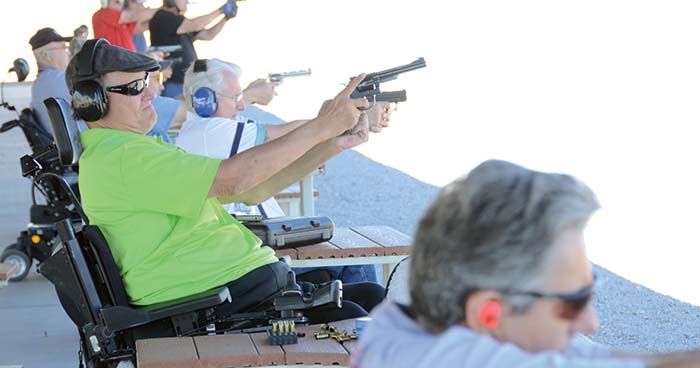Shooting singles at the 16 yard line at The Nevada Chapter of Paralyzed Veterans of America (PVA) Trap Shoot.
By Mikey Entingh and Patty Sweat, Photos by Robert Butterfield
The Nevada Chapter of Paralyzed Veterans of America (PVA) held their 14th annual PVA Trap Shoot at the Clark County Shooting Park, on March 20-22, 2015. The Nevada Chapter was chartered in 1999, covering Nevada and part of Utah from their headquarters in Las Vegas, Nevada.
About the PVA
Returning home from World War II, a band of brothers with spinal cord injuries joined together and decided that, despite their traumatic injuries, they would continue to live their lives with dignity. Although the nation was grateful for their service, it offered few solutions to the challenges these men would face. In 1946, the Paralyzed Veterans of America (PVA) was formed. The group began rallying on the basic necessity of accessibility, such as cutouts on sidewalks, parking spaces, wider doors, and later, press-open doors. This would prove challenging as the Americans with Disabilities Act was not in effect at the time.
Now, more than sixty-nine years later, The PVA is a leader in quality health care for their members, research and education, benefits, and civil rights for veterans worldwide. “Today, the work continues to create an America where all veterans and people with disabilities, and their families, have everything they need to live full and productive lives.” (www.pva.org)

Adaptive Sports are a huge part of the PVA. These sports promote health, wellness, and fitness, and the camaraderie that completes the package is a great stress reliever – a way to work out issues without actually sitting on a couch talking with someone. These activities teach individuals that what they once thought impossible, because of their injury or disease, is now possible. They open so many doors and once they realize “Wow, I can play basketball” or “I can hand cycle”, they begin to ask, “What else can I do?” Next thing they know, they are back out in society being productive citizens. “The PVA builds confidence,” Julie Johnson, Executive Director of the Nevada Chapter states. “‘Wow, I never tried this before,’ and next thing they know, they are coming back to their respective chapters wanting to participate in more and more sports. (Members) become more active within their chapters, volunteering at certain events, getting back to ‘that something special’ they had when they were active duty.”
The PVA showcases their sports annually at an event called the National Veterans Wheelchair Games, and it moves from city to city each year. This year it will be held in Dallas, June 21-26 with more than 600 wheelchair athletes from all over the United States and Great Britain competing. Events include basketball, swimming, table tennis, billiards, bowling, bocce ball, shooting (both air rifle and pistol), and trapshooting. There are also a number of track and field events, hand cycling, and quadriplegic rugby – a legitimately violent sport – also known as Murderball, popularized by the documentary film Murderball (2005). The NVWG is a huge undertaking every year.

PVA Shooting Sports
PVA Shooting Sports run their competitions just like any other shooting competition that is able-body. There is no distinction between anyone that is injured or able-bodied. They follow the Amateur Trapshooting Association rules, with one exception: an award for High Overall Spinal Cord Injury Winner. “You’ll see amputees, non-visible wounds, and wheelchairs. There will be individuals present that I served with, that were injured from Iraq and Afghanistan.” states Andy MacDonald, Associate Director for Shooting Sports.
The competition is a non-registered shoot, which means it is not recognized by the Amateur Trapshooting Association – yet. Nevada PVA Trap Shoot still attracts members from other chapters just to support because, “It’s fun and we love doing it. We get paid for this, that’s the best part!” Andy and Julie exclaim and give each other high-five. “As a shooting program, we have the largest of any veterans organization out there, most of them combined. We hold the flag for that, and have been doing this since the 80s with 2-3 shooting competitions a month across the country.”

Shotgun Competition
Saturday and Sunday, 21-22 March, were allotted days for the trapshooting portion of the competition. It consisted of 100 single targets at the 16 yard line and 50 pairs of doubles, also at the 16 yard line for Saturday. On Sunday, 100 targets at a handicap yardage (18-27 yards based on proficiency) was shot.
Among the sponsors and supporters were, Fiocchi USA, Leupold, Glock, Safari Sun, Rolex Vans, SKV Shotguns, SoftTouch Customs Stocks, Invacare and Better Life Mobility Center for the Chapter.
“Adaptive sports is number one in opening doors for involvement in so many areas. I’ve been involved with the PVA since 1987 and I attend as many PVA shooting events as I can, not only to support the organization and to see the guys I have ties with for over 30 years, but for the camaraderie that you can’t get anywhere else. When I was injured, a PVA service officer came into my hospital room and I had never heard of the PVA until that moment. The service officer answered questions that no one else could and I’ve been involved since,” states Gordon Moye, Vice President of the Arizona Chapter and member of the PVA National Sports Committee.
Dan Mitchell, a loyal supporter of the PVA and former President of the Osage Sportsman’s Club in Park Rapids Minnesota, tries to attend at least four shoots a year. “PVA (are an) awesome group of people! We all look forward to going to the shoots. There are 12-14 shoots a year, all over the United States, with new people joining every year with the common goal in trying to shoot well. These shoots, as well as the PVA family, really help out the psychological part of being a wounded veteran and disabled.”
This was Nevada Chapter’s 14th Annual Trap Shoot; one of the longest in the circuit. Other shoots are held in Redlands, Green Bay, Sumner, Baltimore, and Tampa.

Veterans Assistance
There is a misconception that PVA is just for paralyzed veterans. Quite the contrary, they assist in veterans that are identified as quadriplegic, walking quads, incomplete paras, walking paras, walking members, spinal cord injury, or disease; they are a big supporter for Multiple Sclerosis (MS) and Amyotrophic Lateral Sclerosis (ALS aka Lou Gehrig’s Disease, brought to light to many by the recent Ice Bucket Challenges).
PVA partners with hospitals and are informed immediately by social workers if their patient is a veteran with a spinal injury, and they are assigned a National Service Officer (NSO), who will assist in claims and attend to their families during transition and sustainment. Paralyzed veterans national officers and the PVA’s 34 chapters represent thousands of veterans in all 50 states, the District of Columbia, and Puerto Rico. The focus of the PVA NSO is on the mission. However, if approached by veterans that do not fit the categories mentioned above, NSO’s do not turn them away. They instead guide veterans to another organization that may better suit them.
Paralyzed Veterans of America, Nevada Chapter
The mission of the Nevada PVA is to improve the quality of life of the U.S. military veterans and others who have spinal cord dysfunction through the use of advocacy, research, sports and recreation, education and communication.
Whether veterans left the military decades ago or recently transitioned into the ‘civilian sector’, all veterans miss the camaraderie. There’s an unspoken bond of duty, honor, and service formed among veterans that have served, especially in combat and overseas. No matter when, where, or how you served, or what branch, there is a connection amongst veterans – a supportive role in the understanding of the issues that may affect their well-being, or get in the way of relationships, work, or daily activities. PVA not only aids in the healthcare and benefits for Veterans who have been injured or developed a debilitating disease, it helps reestablish that connection.
For more information, including upcoming shooting events for 2015, please visit www.pva.org/shootingsports or contact Andy MacDonald, Associate Director for Shooting Sports, at andym@pva.org.
For more information on the Nevada Chapter, please visit http://nevadapva.org/ or contact Julie Johnson, Executive Director at nvpva@aol.com.
| This article first appeared in Small Arms Review V19N5 (June 2015) |











